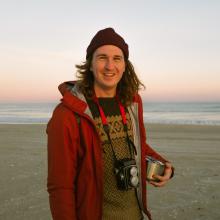
Zachary Garmoe
Tell us about your work/ research. What kinds of things do you do?
I am an early career filmmaker specializing in science and natural history documentaries. More specifically, I focus on making short films about the scientific process and how we as a society perceive the so-called natural world. I also enjoy using film and video as a tool for scientific research, not only to promote or showcase it. Prior to this work I was a scientist specializing estuarine ecology, specifically long term monitoring of forage fish and continuous water quality monitoring. Blending these two fields is where I feel the most comfortable. Seeing the remarkable work my scientist friends and colleagues undertake and creating films that showcase not only why their work is important, but also the broader motivations which drive them to do what they do. My work crosses a number of scientific boundaries, from field biology to physics, depending on the specific project I have the pleasure of working on. Currently I am working on a projects with a group launching high-altitude weather balloons during the solar eclipse, and another into the localized impacts of road ecology.
What sparked your initial interest in your career?
I have always found photography and film fascinating, even before I entered into the sciences. Yet for most of my early career I perused it as a hobby while focusing on marine and estuarine ecology. Photography alone never fully interested me, and I wanted to focus on building my skills in the sciences. However as my hobby continued to dominate my free time and creep into my profession, I found that the research questions I was asking myself professionally often drifted away from the sciences and more into the blend of many different disciplines.
Who influenced you or encouraged you the most?
In freshman year of university, I took an introductory environmental science class on water aimed at non-science majors. The professor, Dr. Susanne Braunschweig sparked an a latent interest in biology and environmental science and convinced me to change my major to the subject, with her as my advisor. I cannot begin to express the amount of gratitude I have for Dr. Braunschweig and her support throughout college, as well as after graduation. I wouldn't be half the person I am without her.
What element of your work/ study do you think is the most fascinating?
I think the most fascinating aspect of my work is getting to meet and work with so many incredible scientists. From launching high altitude balloons to handling ancient specimens to scanning the deep sea, I love seeing how others perceive and interact with the world.
How did you get involved with Ocean Exploration Trust? How did you become part of the expedition team?
I first learned of this program a number of years ago, back when I was still working towards my undergraduate degree. I thought OET's work was incredible, but wasn't in a place to apply. This feeling held steady throughout my early professional career, but now as a graduate student I saw my window and applied to the OET internship program!
What other jobs led you to your current career?
Before starting graduate school, I was working as an estuary and coastal scientist for the Delaware Center for the Inland Bays, working on inshore continuous water quality monitoring. This position, along with my time at the Maryland Coastal Bays Program, gave me a well-grounded knowledge in the practicalities of a career science and helped me better understand the areas which interest me the most.
What are your degrees and certifications?
BA in Environmental Studies and Geography University -- Maryland, Baltimore County 2017
MFA: Science & Natural History Filmmaking -- Montana State University 2026
What are your hobbies?
In my spare time, I love to read, go for walks or hikes, and play the banjo (when no one else is listening). I've gotten into nature journaling the last couple years and enjoy creating cyanotype prints. I also enjoy shooting film photography, both 35mm as well as medium and large format.
What advice would you give someone who wants to have a career like yours?
Always look for the experiences around you. It is easy to get excited about far-off locales, but the natural world is incredible everywhere, if one knows how to look. I remember seeing Yellow-Crowned Night Herons in downtown Baltimore along the Jones Falls River. Working with environmental organizations in the city, was one of the first steps to where I am today. Regardless of where you are, there are almost certainly groups and organizations looking for an extra set of hands. Not only will that help them out, it will give you a better understanding of what exactly it is you want to do.
